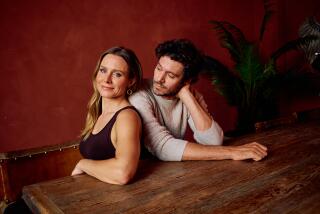Hoping to Be a Confirmed ‘Bachelor’
The men and women--all presumably eligible singles--milled about aimlessly in the dimly lighted club like teenagers at a middle school dance. Some stayed anchored near the walls. Others, like Randy Pena, boldly worked the room, stopping occasionally to ruffle the women perched on the room’s large leather couches with his unique brand of wit.
His black hair was in a stiff coiffure, and he wore a camera-ready wardrobe of varied patterns. Pena was eager for an audience and spoke without taking a breath. “I’ve been on all these reality shows,” he said to one new acquaintance. “I did ‘Blind Date,’ ‘Rendez-View’ and ‘Fifth Wheel’.... I have a knack for these shows. I just have the personality for it.”
It was a warm Friday afternoon outside the Highlands club in Hollywood. Pena, who said he is 29 and works as an artist, was among the first applicants at the open casting call for ABC’s “The Bachelor II.” He hoped to win the show’s title slot but appeared content to chat up the female candidates and TV camera crews. “I’m a hopeless romantic,” he told one reporter. “And I love women.”
It was the first of five open calls to be held nationally in the search for a man whom casting producer Hayley Goggin said should be in “the top 1% of the species.” Producers were also looking for 25 eligible women to vie to be this unknown man’s girlfriend. More than 9,000 people have responded since April. If chosen, they must agree to be filmed 24 hours a day, seven days a week for about six weeks. During that time, the bachelor will date every candidate, then publicly reject them one by one until he’s chosen a girlfriend.
While the first wave of applicants waited outside, casting producers readied staff for an expected onslaught of applicants. (Ultimately, a modest crowd of 275 showed up over five hours.) “Just make sure they’re over 21,” one casting producer said to a staff member. “If they’re under 21, give them my card,” a male staff member quipped. A doorman posted at the entrance checked identification. Waiting candidates completed brief questionnaires that asked for demographics, including job status, salary and education levels. One female candidate, Rosh Shekarestan, a 25-year-old travel coordinator for the Web site WeddingChannel.com, took a levelheaded approach to the process. “It would be really silly for anyone to be really invested in this,” she said. “You have to keep in mind: This guy is dating 24 other people at the same time.”
While the April finale of the first “Bachelor” hasn’t led to nuptials, 31-year-old Harvard grad Alex Michel chose to move to Los Angeles from San Francisco to “explore” a relationship with 23-year-old event planner Amanda Marsh, who is moving from Kansas.
*
The Great Fitzgerald
As a student at Amherst College, director-novelist Henry Bromell was obsessed with F. Scott Fitzgerald. He immersed himself in the writer’s rich prose and mythic history and made a summer pilgrimage to his former homes in New York, France, Minnesota and Hollywood. The trip produced an article for the school newspaper and little else for two decades.
Tonight, however, Bromell’s preoccupation with Fitzgerald comes full circle with the Beverly Hills premiere of “Last Call,” his Showtime film about the writer’s final 18 months, during which he wrote “The Last Tycoon” in Hollywood. The film airs for the first time Saturday.
“Yes, it’s been a long journey,” Bromell said by phone Friday. Until now, he said, his Fitzgerald fascination “never seemed to have any practical consequences.” (That is, aside from inspiring Bromell’s own talent for fiction, which eventually earned short-story writing awards and a spot on the bestseller list. This week, his critically acclaimed novel “Little America” is being released in paperback by Vintage Books.)
Bromell’s interest in directing a film about Fitzgerald emerged about 11 years ago, when a friend recommended “Against a Current: As I Remember F. Scott Fitzgerald” (Creative Arts Book Co., 1985), a memoir by Fitzgerald’s former secretary Frances Kroll Ring. Ring was skeptical of Bromell’s pitch to write a screenplay based on her book. “I had to convince her I knew what I was doing,” he said.
Ultimately, Bromell optioned the book for $500 a year, which he paid dutifully until he found funding for the production. In 2000, Showtime stepped in. However, Bromell said he shot the picture for the big screen in hopes that it would make the leap from television.
In retrospect, Bromell said, his work with Ring brought him amazingly close to Fitzgerald. While shooting the film, he got to know the master writer intimately, from the brand of cigarettes he smoked to his affection for fudge. “It was a little spooky at times.”
*
Quote/Unquote
“Clubhouses are probably ready for an openly gay ballplayer. The players are a diverse enough group now that I think they could handle it.” --Mets manager Bobby Valentine in the June/July issue of Details magazine.
City of Angles runs Tuesday through Friday. E-mail: [email protected]


